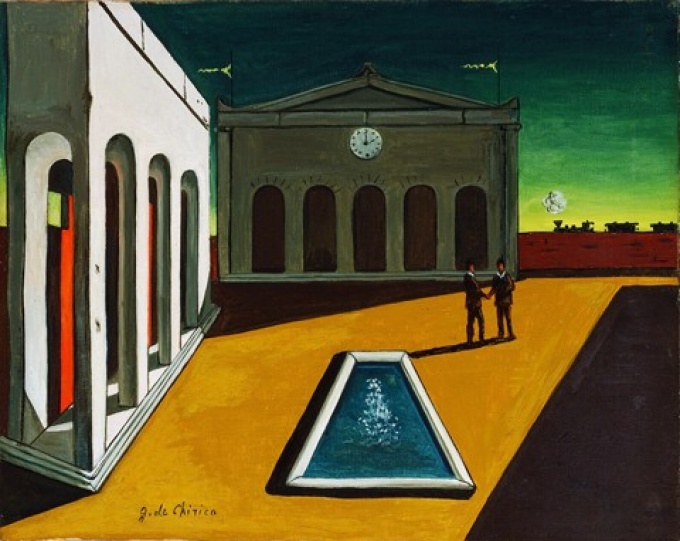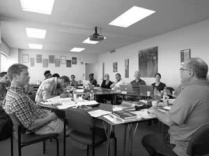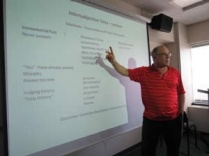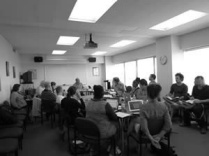2014: Levinas and Kant: The Primacy of Ethics

"Italian Square" by Giorgio de Chirico
July 7-11, 2014
Buffalo, NY
Scholars from around the world travelled to Buffalo and engaged in a week-long intense discussion of the philosophies of Emmanuel Levinas and Immanuel Kant, their similarities and differences especially regarding the primacy of ethics. In addition to classroom lectures and discussions, informal conversations and socializing included group lunches on campus, an opening BBQ at Ellicott Creek Park on Monday evening, a Wednesday afternoon visit to Niagara Falls, including a ride on the Maid of the Mist and dinner at Top of the Falls Restaurant on Goat Island, and a concluding Friday Happy Hour and dinner at a local Buffalo restaurant on Maple Ave.






DIRECTOR:
Richard A. Cohen, Professor of Philosophy, Chair of the Department of Jewish Thought, University at Buffalo, Buffalo, New York. Professor Cohen is one of the world’s preeminent Levinas scholars, author of several books on Levinas, the most recent of which is "Out of Control: Confrontations between Spinoza and Levinas" (2016), translator into English of four books by Levinas, and author of numerous articles in modern and contemporary continental philosophy.
SPONSORS:
The Levinas Center; Institute of Jewish Thought and Heritage (including a donation from Florence Edlin); Humanities Institute, University at Buffalo, Buffalo, NY
LOCATION:
University at Buffalo
640 Clemens Hall
North Campus
Buffalo, New York 14260
TOPIC DESCRIPTION:
Both Emmanuel Levinas and Immanuel Kant assert the primacy of ethics. At the same time, both see this primacy as supporting rather than undermining science. Indeed, for Levinas ethics provides the very justification of truth. Nevertheless, despite their proximity, these two thinkers are as far apart as classical and contemporary philosophy. The critical idealism of Kant concludes and culminates the grand project of representational philosophy – the primacy of knowledge – which began with Parmenides’ equation of being and logos. In the Critique of Pure Reason, Kant shows the grounds and the boundaries of natural science and metaphysics. Building on these analyses, in the Critique of Practical Reason, he shows the grounds and boundaries of rational ethics. Post-Kantian thought from Schelling to Nietzsche to Heidegger, from Romanticism to Expressionism to Dadaism, breaks with Kantian objective rationality by shifting to creative imagination. Levinas opens up a radically different post-Kantian path: renewing the primacy of ethics Kant proclaimed by liberating it from its Kantian dependence on objectivist rationality. For Levinas neither science nor aesthetics but rather “ethics is first philosophy.” Only in this revolutionary ethical reorientation of philosophy do science and aesthetics for the first time find their proper significance. Thus Levinas does not reject ethics in a positivist or pretentious “beyond good and evil.” But this is because ethics begins not in respect for law, not in autonomy, not in pure freedom, but rather in responsiveness to the suffering of the other person. Moral responsibility emerges in and as the primacy of the other, the other’s transcendence as ethical obligation. To better understand what is new in Levinas’s thought this seminar will compare and contrast it to Kant, and especially to the Kantian “primacy of practical reason.” We will enter into a dialogue between Levinas and Kant based on the idea that though these two thinkers are radically separated by the divide between classical representational philosophies oriented by eternity, the soul and divinity, and contemporary philosophies which takes seriously time, history, language, the body and worldly being, that these two thinkers are in special and fruitful proximity across this divide.
PARTICIPANTS:
- Viktoras Bachmetjevas, PhD candidate, Philosophy; Philosophy Instructor, Kaunas University of Technology & Vytautas Magnus University, Kaunas, Lithuania.
- Kyle David Bennett, PhD, 2013, Philosophy of Religion, Fuller Theological Seminary, Pasadena, CA; Adjunct Prof. of Philosophy, Caldwell College, New Jersey, USA.
- Sasha-Mae Eccleston, PhD candidate, Classics, University of California at Berkeley, USA; Mellon; Postdoctoral Fellow in Classics at Pomona College, starting Fall 2014.
- Parnika Goel, PhD candidate, Philosophy, Jawaharlal Nehru University, New Delhi, India
- Kevin Houser, PhD candidate, Philosophy, Indiana University, Bloomington, Indiana, USA.
- Stephen J. Innes, PhD, 2013, Philosophy of Religion, King’s College London, UK; Graduate Teaching Assistant, King’s College London.
- Ronke Oke, PhD candidate, Philosophy, Pennsylvania State University, State College, PA, USA.
- Irina Poleshchuk, PhD, 2009, Philosophy, University of Helsinki, FInland; Post-Doctoral Researcher, University of Helsinki, Finland, and Docent, European Humanities University, Vilnius, Lithuania.
- David Martinez Rojas, PhD candidate, Philosophy (Social and Political Thought), University of Sussex, UK.
- Sarah Weil, MA student, Philosophy, Hebrew University of Jerusalem, Israel.
AUDITORS:
- Fosco Bugoni, BA student, Philosophy, University of Milan, Italy.
- UB Graduate Students: Chris Buckman, Anthony Fay, Thomas Gezella, Emina Melonic, Zane Welte.
- UB Undergraduate: Isaac Burger
ASSISTING LEVINAS SCHOLARS:
- James McLachlan is Professor of Philosophy and Religion at Western Carolina University. He has assisted at the first two LPSSs, in Vilnius and Buffalo. He is past co-chair of the Mormon Studies Group at the American Academy of Religion, member of the board of the Institute for American Religious and Philosophical Thought, and organizer of the Personalist Seminar. His research interests include 20th century Continental thought, especially Levinas, Sartre and Berdyaev. He also publishes on American and European Personalism, Process Theology, Romanticism and idealism, and Mormon Theology.
- Jolanta Saldukaitytė is co-organizer of the LPSS, and was organizer of the centennial conference on the philosophy of Emmanuel Levinas held at the University of Vilnius, Vilnius, Lithuania, April 2006. She has published several articles on Levinas’s philosophy, especially in its relation to the thought of Martin Heidegger. In 2011 she defended her PhD thesis at the University of Vilnius on “Thinking of Difference in Heidegger and Levinas.” She is currently teaching philosophy at the Lithuanian University of Educational Sciences and at the Vilnius Gediminas Technical University.
ORGANIZERS:
- Jolanta Saldukaitytė, Phd, Philosophy, Vilnius Gediminas Technical University, Vilnius, Lithuania
- Richard A. Cohen, Professor of Philosophy, Chair of the Department of Jewish Thought, University at Buffalo, Buffalo, New York
CONTACT: levinas.center@gmail.com